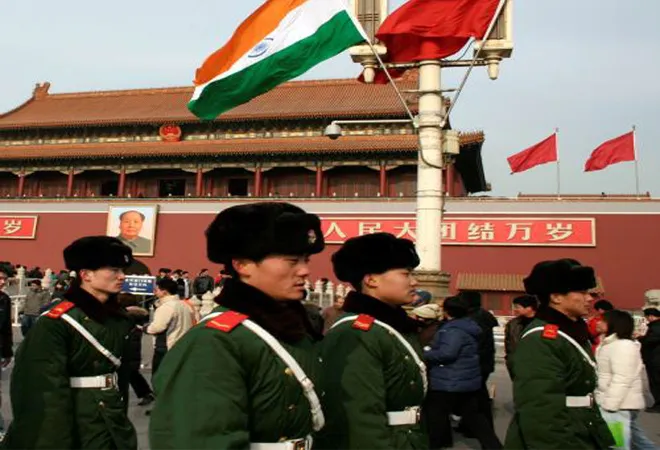As the India-China standoff continues at the Doklam plateau, reams have already been written about the sources of Chinese conduct. All sorts of analyses are doing the rounds, from the centralisation of power under Xi Jinping and the forthcoming Communist Party Congress to the growing belligerence of the Chinese media and Beijing’s growing need to show its displeasure to New Delhi for boycotting the Belt and Road Initiative and underline who the real boss is in South Asia. While all these factors can shed some light on recent Chinese behaviour, the ultimate factor remains a structural one — China’s growing power is altering its view about its own interests, which are now in an ever-expansive mode.
Just look at its behaviour in recent weeks, apart from its stand-off with India. Last week, China told Japan to “get used to it” after it flew six warplanes over the Miyako Strait between two southern Japanese islands in a military exercise. Taiwan’s ministry of national defence also complained that the Chinese bombers flew just outside its air defence identification zone. China also dispatched troops to Djibouti as it gets ready to formally establish the country’s first overseas military base. And as the world paid its muted tribute after the demise of Chinese dissident and 2010 Nobel Peace Prize winner Liu Xiaobo, China shrugged it off, arguing that “conferring the prize to such a person goes against the purposes of this award. It’s a blasphemy of the peace prize.”
All this has happened in just the past one week. China is everywhere these days, challenging the global order at times, and at others trying to be the guarantor of the global economic order in the age of Donald Trump.
In his address to the World Economic Forum earlier this year, Xi delivered a strong defence of globalisation, underlining Beijing’s credentials in an attempt to usurp America’s traditional role as the champion of free trade and open markets. But it should have been clear to anyone who has observed China closely that its credentials as an exemplar of market economy remain very weak for a nation that has benefited enormously from the America-led global economic order. China’s history of using currency manipulation, closed capital markets, and subtle non-tariff barriers leading to trade imbalances hardly makes it a global economic leader.
Yet the world is willing to buy this with a certain degree of credulity because of the attractiveness of a rising power. We want to believe in China’s rhetoric because that is very reassuring, leaving all the difficult questions for another day. So long as China is rising, it needs the rest of the world, and so it would like to preserve the extant order, we want to think.
Indian policymakers too have been part of this vacuous thinking for the past two decades. They got carried away by the propaganda which often managed to put China and India in the same league, assuming that being peers would somehow preclude any overt hostility. They also got carried away when their Chinese interlocutors assured them of their benign intentions and how there was enough space for both China and India to rise. Then came the biggest charade of all — BRICS (Brazil, Russia, India, China, South Africa). From an investment banker’s catchy phrase for his clients, it was converted into a geopolitical grouping. New Delhi entered into it with its eyes closed, only to be bamboozled by Chinese attempts to convert it into an extension of its own economic superiority.
Chinese power has continued to grow over the last two decades. Concomitantly, its interests continued to expand.
As China ventured into South Asia and the larger Indian Ocean region, India looked on without any sense of purpose. Reassured by our Sinologists that the Chinese have no expansionist designs, we continued to neglect our military and logistical preparedness, not even bothering about our border infrastructure. After all, if the Chinese didn’t want to have a conflict with us, what was the point in building up our defences?
As China continued to move closer, Indian policymakers were left assuaging Chinese sensitivities. We would not meet the Dalai Lama publicly so as not to offend Beijing. We would not have joint exercises with like-minded countries in the region lest China think ill of us. We would not sign foundational agreements with the US as this would make us America’s camp followers. It didn’t matter that this would restrict our ability to track Chinese submarines in the Indian Ocean. And, of course, we will keep talking of non-alignment because that’s the best way to guarantee our interests in a world shaped by Chinese power.
Even today Indian policymakers are being advised that Chinese troops are knocking in Bhutan and India is being threatened because of India’s own fault in trying to get too close to the US and standing up for India’s core interests. This is balderdash of the highest order and it should be rejected with the contempt it deserves. China’s growing assertiveness is a function of China’s own rising power and its own assessment of its interests. It has very little to do with India’s behaviour. We have misunderstood China in the past and there is a danger that we will continue to do so if we don’t comprehend the underpinnings of Chinese behaviour today.
Power by its very nature is expansionist. China’s growing economic and diplomatic footprint around the world is now being followed by its military footprint, and that’s the reality of great power politics. To understand that is not being belligerent, but preparing oneself adequately.
This commentary originally appeared in Live Mint.
The views expressed above belong to the author(s). ORF research and analyses now available on Telegram! Click here to access our curated content — blogs, longforms and interviews.




 PREV
PREV


